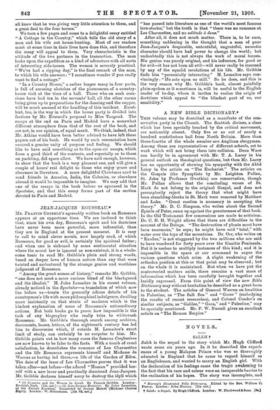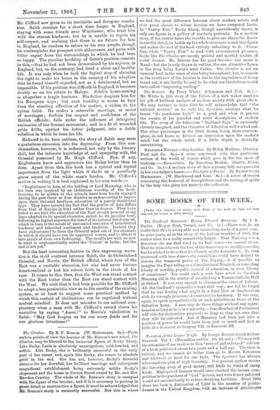NOVELS.
SALEH t
Saleh is the sequel to the story which Mr. Hugh Clifford wrote some six years ago. In it he described the experi- ences of a young Malayan Prince who was so thoroughly educated in England that he came to regard himself as an Englishman, and wanted to marry an English girl. With the declaration of his feelings came the tragic awakening to the fact that his race and colour were an insuperable barrier to the realisation of his hopes. The story was incomplete, and
* Hurray's Illustrated Bible .Dicticnary. Edited by the Rev William C. Piercy. London : John Murray. [21s. net.]
1' Sala: a Sequel. By Hugh Clifford. London : W. Blackwood &Bons. Ds.]
Mr. Clifford now gives us its inevitable and foregone conclu- sion. Saleh remains for a short time longer in England, staying with some friends near Winchester, who treat him with the utmost kindness; but he is unable to regain his self-respect, and realising that there is no future for him in England, he resolves to return to his own people, though he contemplates the prospect with abhorrence, and parts with bitter regret from the surroundings in which he bad been so happy. The peculiar hardship of Saleh's position consists in this,—that he had not been demoralised by his sojourn in England, but, on the contrary, bad lived a clean and healthy life. It was only when he took the logical step of claiming the right to make his home in the country of his adoption that he found himself regarded, not as a detrimental, but an impossible. If his position was difficult in England, it becomes doubly so on his return to Malaya. Saleh's home-coming is altogether a tragic business. His father despises him for his European ways ; but such hostility is easier to bear than the exacting affection of his mother, a victim to the opium habit. He makes a miserable marriage, or series of marriages ; forfeits the respect and confidence of the British officials; falls under the influence of intriguing emissaries of the Senussi movement ; and in a fit of wounded pride drifts, against his better judgment, into a futile rebellion in which he loses his life.
Reduced to its bare outlines, the story of Saleh may seem a gratuitous excursion into the depressing. From this con- demnation, however, it is redeemed, not only by the literary skill, but the intimate knowledge of, and sympathy with, the Oriental possessed by Mr. Hugh Clifford. Few, if any, Englishmen know and appreciate the Malay better than he does. Apart from this, the book has a special and topical importance from the light which it sheds on a peculiarly grave aspect of the white man's burden. Mr. Clifford's motive in writing it is best explained in his own words:—
" Englishmen in Asia, at the bidding of Lord Macaulay, who in his tarn was inspired by an idolatrous worship of the book. learning to be gotten in tho schools, have been busily engaged during the past three or four decades in endeavouring to impose upon their Oriental brethren education of a purely Occidental type. They have ignored the fact that the genius of Asia differs from that of Europe in kind rather than in degree. They have failed to see that the education of the East should proceed along lines adapted to its special character, suited to its peculiar bent, following in logical sequence the trend of its natural development, which in turn is the result of uncounted centuries of transmitted tendency and inherited sentiment and tradition. Instead they have endeavoured to force the Oriental mind out of the channels in which it should have run its appointed course, and to divert it into canals of their own fashioning. The results are with us now in what is euphemistically called the 'Unrest' in India : but the end is not yet."
Not the least interesting feature in this engrossing narra- tive is the vivid contrast between Saleh, the de-Orientalised
Oriental, and Norris, the British official, whose love of the East was a veritable obsession, but who had never become denationalised or lost his robust faith in the ideals of his race. It comes to this, then, that the West can stand contact with the East better than the East can stand contact with the West. We wish that it had been possible for Mr. Clifford to adopt a less pessimistic view as to the results of the existing system, or at least to suggest some practical method by which this contact of civilisations can be regulated without mutual mischief. It does not minister to our national com- placency when a man with Mr. Clifford's record closes his narrative by saying "Amen !" to Norris's valediction to Saleh : "May God forgive us for our sorry deeds and for our glorious intentions !"

































































 Previous page
Previous page